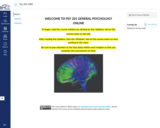
Digital Intro http://digitalintro.wescreates.wesleyan.edu/, part of the NSF-funded Passion-Driven Statistics https://passiondrivenstatistics.com/ initiative is working to connect disciplinary content with modern digital skills through project-based learning. Check out the video syllabus https://www.youtube.com/channel/UCFACQQDHiBabPcRJIenRNBw, and the current series of digital projects http://digitalintro.wescreates.wesleyan.edu/projects/ aimed at empowering students to investigate for insight, teach to learn, advocate for influence, design for change, and make learning stick!
For those wanting to flip their classroom, here are our new video lessons. Additional videos on emotion, mental health treatment, and language are coming soon!
With the goal of promoting genuine equity and inclusion, we are 100% committed to Open Educational Resources (OER) both in the content provided and in the contributions that the digital intro community will make. We are excited to share current resources and hope to have many more on the way!
Many instructors first thought is how much time they would have to spend teaching the technology instead of content to students. When using data, we are making versions in Tableau. Super easy. Also, many of the projects aren’t data oriented. Students can use power point, Adobe Spark or Canva, all tools they have been exposed to or can pick up easily. Some of our more interesting projects can be done with Power Point. https://digitalintro.wescreates.wesleyan.edu/the-brain-through-visual-mnemonics/
You are welcome and encouraged to share these materials widely. As you plan for your fall semester courses, please reach out if you are interested in collaborating with us! ldierker@wesleyan.edu
We will provide updates through the Passion-Driven Statistics Community page on LinkedIn. Please join is there! https://www.linkedin.com/groups/8562708/.
- Subject:
- Psychology
- Social Science
- Material Type:
- Activity/Lab
- Full Course
- Homework/Assignment
- Lesson Plan
- Teaching/Learning Strategy
- Author:
- Dr. Lisa Dierker
- Date Added:
- 07/26/2021

